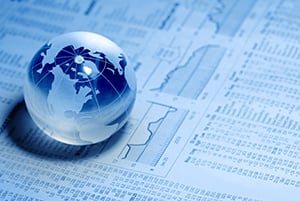 For those who haven’t heard, global markets slumped yesterday as a Chinese real estate developer, Evergrande, was reported to be approaching bankruptcy. For many, this news brings to mind the great financial crisis of 2008. Back then, a collapsing real estate sector almost took the U.S. and global banking system down, starting with the Lehman Brothers investment bank. Now, the fear is that Evergrande could kick off China’s “Lehman moment.” In other words, many are starting to worry that we could be facing another global financial crisis.
For those who haven’t heard, global markets slumped yesterday as a Chinese real estate developer, Evergrande, was reported to be approaching bankruptcy. For many, this news brings to mind the great financial crisis of 2008. Back then, a collapsing real estate sector almost took the U.S. and global banking system down, starting with the Lehman Brothers investment bank. Now, the fear is that Evergrande could kick off China’s “Lehman moment.” In other words, many are starting to worry that we could be facing another global financial crisis.
Is this news worth paying attention to? Certainly. It’s scary stuff, if true. Is it worth worrying about? No, not yet. The fact is that there are significant differences between both the situation then and the situation now, as well as between the U.S. position in global financial markets and the Chinese position. When you add those details up, the situation does not look nearly as scary.
Another 2008?
Let’s start with Evergrande itself. Despite the worry, so far this looks like a corporate bankruptcy and not something worse. It’s a big one, to be sure, but one that can be handled within the system. Bondholders will lose money, other companies will be affected, and life will move on. So far, that situation is what we see and not something bigger.
Second, even if this does turn into something bigger, something that affects the Chinese economy and markets as a whole, the Chinese government has more money—and more legal powers—to contain the damage than the U.S. and western governments did back in 2008. The Chinese government can and will try to contain the damage before it starts to threaten the economy as a whole. The U.S. could do it in 2008, and the Chinese can do it now. They have, in fact, contained similar crises before.
Third, even if they don’t (or can’t), the Chinese financial system and the rest of the world are much less integrated than the developed world was in 2008. The contagion possibilities are simply more limited. We have seen several significant episodes of financial turbulence in China that did not cross over to the developed markets, the most recent of which has been the disruption of the Chinese tech companies in the past couple of months. We have repeatedly seen that China can have significant turmoil without disrupting the rest of the world.
Finally (and which ties in with the previous three points), the bus that you are watching is rarely the one that ends up hitting you. Both the U.S. government and regulators, and U.S. banks and financial institutions, are very aware of the situation in China, and they are at least thinking about how to minimize the risks. That was not the case in 2008. Since this is not coming out of the blue, any damage will be contained—and likely much less than is now feared.
What Are the Markets Saying?
If you look at the markets, this is what they are saying as well. After yesterday’s drop, U.S. markets are still about where they were a couple of months ago and still within less than 5 percent of their highs. This morning, markets are up slightly. This kind of a pullback is normal behavior for markets on bad news—something we last saw in July—and therefore a rational response to real but contained risks. As crashes go, this could be much worse.
In fact, the Evergrande news is probably the trigger, but not the cause, of the small pullback we have seen. Markets have been unusually steady in recent months, and a pullback was overdue. Fundamentals are still solid, with earnings rising and valuations within the recent range. So far, this pullback looks to be driven by fear, rather than something worse.
We could of course get more volatility, even substantially more. Fear-driven moves can be sharp, and we could well see more scary headlines out of China. Hang on tight. But even if we do see more volatility, what we have seen so far suggests that conditions remain favorable, and that it should be fairly contained.
So, Is Evergrande a Big Deal?
Yes, from a business perspective. Lots of money will be lost if the company goes bankrupt, and there may well be damage to Chinese markets and the Chinese economy. Will it affect the U.S. investor? It might, to a minor degree, as any significant bankruptcy around the world might. But will it disrupt the Chinese financial system as a whole or even the global system? Right now, that possibility looks extremely unlikely. Hurricanes can do damage, but for U.S. investors, right now this looks like a hurricane on the other side of the world—scary and damaging, but not a significant threat to us.
As always, pay attention, but keep calm and carry on.


 Print
Print

